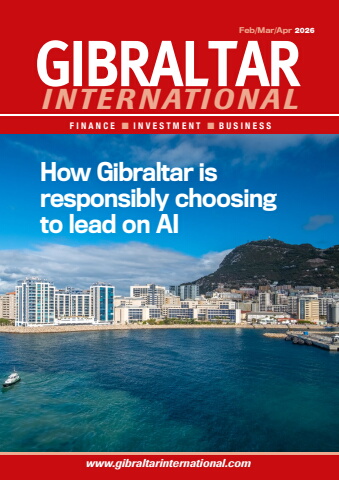Gibraltar’s unique passport for EU access to the UK
By Valerie Holliday and James Lasry, Financial Services Partners, Hassans International Law Firm
The financial services industries including banking, insurance, investment and fund management, have always played an important role in both the UK’s and Gibraltar’s economies. Much of this business has been cross-border with other EU Member States, often using the EU financial services passporting regime. Brexit has put an end to this such that UK firms can no longer do business in the EU on the basis of their home state licenses. Neither, indeed, do EU firms have direct access any longer to one of the world’s greatest capital markets. Clearly alternative solutions must be found. Luckily, Gibraltar is able to offer opportunities through its ongoing passport regime with the UK.
The reality is that many companies must address their loss of market access to the UK which they have enjoyed under EU passporting rights. Clearly, one option is for EU firms to set up in the UK and go through the FCA regulatory licencing processes. Prior to Brexit, there were c 6,000 financial services companies that passport into the UK from the EU. It is easy to see how the regulatory bottlenecks may be tight for new applications at the UK regulators. The risk of losing revenues is very real.
Gibraltar is now the only jurisdiction in the world that enjoys passporting rights into the UK. The origins of the Gibraltar UK financial services passport actually stem from an anomaly in EU legislation which provided for passporting only between member states. Gibraltar, although a separate jurisdiction from the UK, with its own legislature and financial regulator, was considered as the same Member State in the context of EU legislation. This meant that Gibraltar firms could passport to other Member States such as France and Germany but not to the UK. This was addressed in the Financial Services and Markets Act 2000 (Gibraltar) Order 2001 (the Gibraltar Order) which was an instrument of primary legislation in both the UK and Gibraltar and the product of a bilateral agreement between those jurisdictions. The Gibraltar Order in essence allowed for the rights enjoyed under the European passport to be extended bilaterally between the UK and Gibraltar.
EU entity
Post Brexit, the UK and Gibraltar governments have agreed that Gibraltar licensed firms will continue to be able to provide their services into the UK market and set up branches in the UK on the strength of their Gibraltar licence. Therefore, for an EU entity that has lost its right to passport into the UK, a new Gibraltar subsidiary (or sister company) may be able to continue to access the UK market. Gibraltar is the only jurisdiction outside the UK that can offer this.
The UK and Gibraltar Governments are committed to ensuring that such market access continues. Although the substance of the passport is intended to continue into the long term, the Gibraltar Order has been superseded by other legislation that takes the post-Brexit framework into account. The UK Government has published the Financial Services (Gibraltar)(Amendment)(EU Exit) Regulations 2020 which extends by 12 months the transitional arrangements under Parts 2 and 3 of the Financial Services (Gibraltar) (Amendment)(EU Exit) Regulations 2019 which, inter alia, facilitates the access by Gibraltar-based firms to the UK financial services market and vice versa. These transitional arrangements have now been extended until the end of December 2021.
The Gibraltar Government has published the Financial Services (Passport Rights and Transitional Provisions) (EU Exit) Regulations 2020 which similarly retain reciprocal passporting rights for Gibraltar firms and UK firms in respect of financial services which are regulated under the Single Market Directives.
Gibraltar Authorisation Regime
These arrangements will be superseded by a new long-term framework as part of the Financial Services Bill that has already been introduced to the UK Parliament on 21 October 2020. This new Bill will establish a new legal and institutional framework “the Gibraltar Authorisation Regime” to provide for mutual market access and aligned standards in financial services between the UK and Gibraltar.
The framework will reflect the unique and historical relationship between the two jurisdictions which do not apply to other jurisdictions. The regime will be based on the three following conditions:
- Compliance with certain objectives such as maintaining financial market stability and the protection of consumers;
- The alignment of law and practice so that there is a consistency of approach in the two jurisdictions; and
- Close cooperation between the UK and Gibraltar authorities in order to ensure that they support each other in the fulfilment of their respective duties and exchange relevant information as required.
It is expected that the development, implementation and oversight of the Gibraltar Authorisation Regime will be likely to involve further secondary legislation on both sides.
Firms based in Gibraltar have long made extensive use of the market access arrangements between Gibraltar and the UK. The insurance industry, in particular, has made significant inroads into the UK market such that over 20% of all motor insurance policies are written by Gibraltar firms. Banking and fund management also benefit from the passport. The Gibraltar UK passport is therefore a tried and tested route into the UK.
Unique proposition for EU firms
Although the Gibraltar Financial Services Commission (GFSC) is statutorily obligated to maintain the same regulatory standards as those of the FCA, there is no doubt that a regulator serving a smaller market is able to process applications with greater speed.
This, together with Gibraltar’s low tax regime and its culture of good corporate governance make it a jurisdiction of choice with a unique proposition for EU firms wishing to do business in the UK.
This article should not be regarded as intended to provide legal advice and should not be relied on. Specific legal advice in relation to any matter should be sought.





